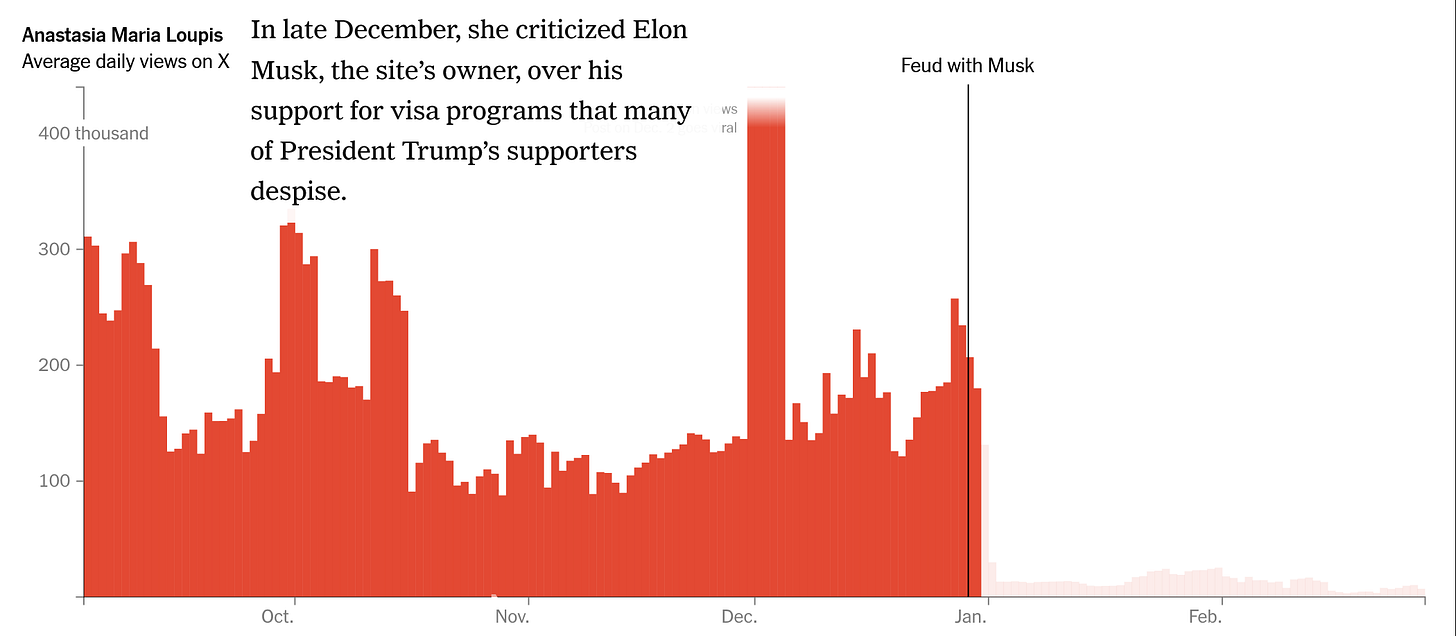Weekly Groundings are published every Friday to highlight the most interesting news, links, and writing I investigated during the past week. They are designed to ground your thinking in the midst of media overload and contribute to Handful of Earth’s broader framework. Please subscribe if you’d like to receive these posts directly in your inbox.
If you’re already subscribed and want to help the publication grow, consider sharing Handful of Earth with a friend.
“Israel’s A.I. Experiments in Gaza War Raise Ethical Concerns”
The New York Times reports that “No other nation has been as active as Israel in experimenting with A.I. tools in real-time battles, European and American defense officials said, giving a preview of how such technologies may be used in future wars—and how they might also go awry.”
The article notes that “In the past 18 months, Israel has also combined A.I. with facial recognition software to match partly obscured or injured faces to real identities, turned to A.I. to compile potential airstrike targets, and created an Arabic-language A.I. model to power a chatbot that could scan and analyze text messages, social media posts and other Arabic-language data, two people with knowledge of the programs said. Many of these efforts were a partnership between enlisted soldiers in Unit 8200 and reserve soldiers who work at tech companies such as Google, Microsoft and Meta, three people with knowledge of the technologies said…Yet even as Israel raced to develop the A.I. arsenal, deployment of the technologies sometimes led to mistaken identifications and arrests, as well as civilian deaths, the Israeli and American officials said. Some officials have struggled with the ethical implications of the A.I. tools, which could result in increased surveillance and other civilian killings.”
The authors report on Lavender, the Israeli AI killing machine discussed back in Weekly Grounding #43. It is also the subject of Rosie Adams’ poem, “Lavender Has Red Hands,” also published here at Handful of Earth.
“NYC Woman Attacked By Zionist Mob Speaks Out”
Breaking Points interviews a New York resident who was physically and verbally assaulted by a mob of Jewish Zionists near her home in Crown Heights, Brooklyn. The assault followed a protest and counter-protest during Itamar Ben-Gvir’s visit to the neighborhood. She remains anonymous for fear of further mob attacks. The video footage demonstrates that the police stood back and allowed the Jewish supremacist mob assault to continue. Her chilling interview is worth watching in full.
“The Disgracing of Jordan Peterson”
provides context for Jordan Peterson’s recent comments on the Joe Rogan Experience: “I’ve been thinking about why I find Peterson’s participation in this struggle session especially wince-inducing, and concluded it’s the astonishing intellectual arrogance he now exudes on every media appearance. I also can’t get away from the feeling, which is shared by others, that this is not really the same man intellectually or emotionally that came to our attention in 2016. Say what you want about other Israel apologists like Douglas Murray or Ben Shapiro but they could actually debate you on the nuances of the conflict between Israel and Palestine. Peterson can’t even pretend to have deep knowledge of the conflict, but this hasn’t stopped him joining in on the policing operation against anti-Israel voices on the right.”After discussing Peterson’s political trajectory, Woods concludes: “Watching Peterson become another apologist for the establishment is unfortunate, but seeing him now embrace a role as the establishment head dismissing and demanding the marginalisation of the disaffected young men [he previously championed] is downright shameful. As Peterson burns more credibility and good will with every appearance, it speaks to the intellectual vacuity and desperation of his Zionist allies that they're leaning so heavily on this man.”
“They Criticized Musk on X. Then Their Reach Collapsed”
Meanwhile, Elon Musk’s control of X has created further divisions within the American right. The New York Times “found three users on X who feuded with Mr. Musk in December only to see their reach on the social platform practically vanish overnight. The accounts are the starkest signs yet that Mr. Musk or others at the company have the power to punish critics and that they may be willing to use it, startling free speech advocates who hoped that the billionaire would be their champion.”
Much of Musk’s censorship targeted right-wing influencers who expressed opposition to the H1-B visa regime in the United States: “Ms. [Anastasia Maria] Loupis and Ms. [Laura] Loomer contributed to a torrent of criticism against Mr. Musk over his position on visas for skilled workers. Many Trump supporters with anti-immigrant views want such programs shuttered, while Mr. Musk and other tech leaders support them. While views on Ms. Loomer’s posts returned to their previous highs, Ms. Loupis opened a second account on X in a bid to circumvent any suppression against her. Despite having a fraction of the followers, posts on her new account are getting more views than those posted to her original account. She wrote in January that she planned to sue Mr. Musk and X.”
“Where the West Still Wins”
At The Financial Times, Janan Ganesh reflects on the continued global dominance of the West, especially in cultural domains: “The decline of the west is a profound story. But so is the unevenness of that process: the survival of lots of pockets where very little has changed. The global luxury goods sector features the same Franco-Italian brands that someone in 1990 could have named. The best research universities are still American, as the Nobel Prizes annually attest. Although Saudi Arabia is doing its best, I can think of just one sports league outside the west, cricket’s Indian Premier League, that commands global interest. Judging just from the lingua franca, and from a pie chart of the reserve currencies, an alien observer to our planet would struggle to credit the so-called ‘rise of the rest.’ It is happening, except where it isn’t.”
Ganesh argues that “Change is written about quite enough. The stickiness of things isn’t. Yes, in hard terms, the world has become post-western. (Look at the bluntness of US-led sanctions in recent times.) But what we might call the daily texture of life is unlikely to reflect that fact for decades to come, if ever. This will read like a rich-world boast, but is in fact something of a personal dread. Having travelled a bit in recent months, I sense the west’s ongoing leadership in certain highly visible areas can fool its citizens about their waning clout in the world. I said the Gulf is an education in the global balance of power to come. Well, what an imperfect education. It is hard to steel yourself for a de-westernised future when you are served in English, paying in dollars and one male in three goes about with ‘BELLINGHAM’ and ‘5’ on his perspiring back.”
“Return of the King”
It is also a pressing question of which conceptions of “the West” continue to be relevant. On this topic,
meditates on the difference between European and American nationalism at : “American nationalism was the precise inverse of this [European feudal] value system. It emerged as an explicit rejection of the feudal status order. It wasn’t the democratic institutions of self-governance that distinguished the American colonies from the rest of the world; these were directly inherited from rights, customs and practices that had evolved over centuries in medieval England—rights, customs and practices that had, in their own turn, been transplanted from Scandinavia. In America, however, the colonists did more than insist on their individual rights; they rejected the very basis of political authority in one’s family ancestry. The colonists had left Europe to get away from all that. They abandoned their ancient farms and crossed the ocean to acquire cheap land on the new continent that they could own outright, without owing any duties or obligations to some parasitical lord or other. They came here to work with their hands and enjoy the fruits of their labor in their entirety, to do what they wished with their property and pass it along to their children. They came to toil and be left alone.”He argues that this “was what made American democracy revolutionary—not our system of checks and balances or our particular articulation of individual rights, both of which had their equivalents in the Old World, but our abandonment of the notion that you were born into a social rank derived from your family lineage.”
What grounded your thinking this week? Share in the comments.




Thanks Vincent. I enjoyed this week's selection very much, much of which had passed me by. We're embroiled in Labour's (and even more, the Conservatives') demise at the hands of Reform. British voters are desperate.